While living in Durham, N.C., back in the 1980s, I met a guy who was studying creative writing at Duke University. I have come to think of him as the doomed acolyte. One day he told me that his teacher, venerable Reynolds Price, rolled into the classroom in his wheelchair and gave the class a curious assignment. Price told the students they were not to touch the short stories they were working on for the next week. Don’t change a single word. Don’t add or delete a comma. Don’t even look at your stories.
When the class reconvened the following week, Price asked how many had fulfilled the assignment. About half of the students, including the doomed acolyte, raised a hand. Price then stunned the room by advising those who were able to follow his instructions that they should consider dropping out of the course. His reasoning was brutal and simple: Anyone who is able to stop writing for an entire week — even for a single day — does not have the right stuff to become a writer. True writers, Price was saying, are in the grip of a compulsion. They have to write, and they are powerless to stop doing it. It is why they are alive and it is what keeps them alive.
That story came back to me — and it came into question — when I heard the news that Philip Roth has quit writing fiction. “To his friends,” Charles McGrath wrote in The New York Times, “the notion of Mr. Roth not writing is like Mr. Roth not breathing.” I’m sure Reynolds Price’s friends felt the same way about him. Roth, author of more than 30 works of fiction over the past half century, has stuck a Post-it note to his computer that reads: “The struggle with writing is over.” Roth said he looks at that little sticker every morning and it gives him “such strength.”
I’ve been writing every day for the past 40 years or so, sometimes getting paid to do it and sometimes not, and through all those years I’ve assumed I will keep doing it until my wits leave me or I die. In other words, I’m a long-time disciple of the gospel according to Reynolds Price, a believer that writers are people who are both blessed and cursed by the compulsion to distill their experience of the world into words on a page. But Roth’s startling announcement caused me to begin rethinking this assumption. Why shouldn’t writers be free to stop writing when they they’ve lost their appetite for the grind, or when they feel they’ve lost their edge, or when they’ve said everything they care to say? Isn’t it liberating to think that writers are not slaves, after all, but are actually free to walk away from their desks and never look back? And even though many writers remain productive into their eighties and beyond– James Salter, Toni Morrison, Alice Munro, and Elmore Leonard come immediately to mind — isn’t it preferable for some (most?) writers to quit rather than keep going through the familiar motions?
Of course Philip Roth was not the first writer to retire. Writers have been putting down their pens for many years. Here is a selective and thoroughly incomplete list of the ways half a dozen writers have retired — or tried to — with wildly varying degrees of success:
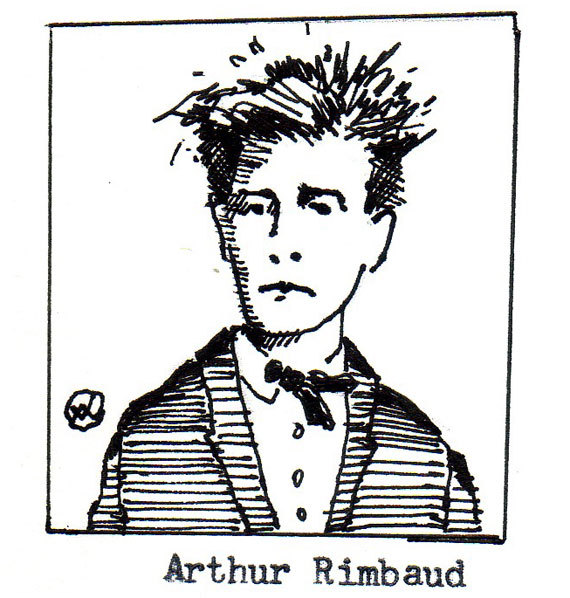
1. Retiring Prematurely: Arthur Rimbaud
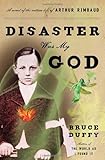 Before reaching his 21st birthday, Arthur Rimbaud (1854-1891), fueled by a diet of hashish, absinthe, and bad behavior, produced dazzling works of poetry and prose that became pillars of modernism. Then he quit writing. He spent the rest of his short life demeaning his literary output while wandering from Indonesia to Africa, working as a soldier, a foreman in a stone quarry, a merchant of coffee and guns. No one has ever solved the great mystery — why did this brilliant wild child quit writing? — though in Bruce Duffy’s novel about Rimbaud, Disaster Was My God, the poet’s lover Paul Verlaine may have come close. “Well,” Duffy’s fictional Verlaine says, “one big reason, perhaps obvious, is he grew up…the child in him died.”
Before reaching his 21st birthday, Arthur Rimbaud (1854-1891), fueled by a diet of hashish, absinthe, and bad behavior, produced dazzling works of poetry and prose that became pillars of modernism. Then he quit writing. He spent the rest of his short life demeaning his literary output while wandering from Indonesia to Africa, working as a soldier, a foreman in a stone quarry, a merchant of coffee and guns. No one has ever solved the great mystery — why did this brilliant wild child quit writing? — though in Bruce Duffy’s novel about Rimbaud, Disaster Was My God, the poet’s lover Paul Verlaine may have come close. “Well,” Duffy’s fictional Verlaine says, “one big reason, perhaps obvious, is he grew up…the child in him died.”
 2. Retiring Selectively: E.M. Forster
2. Retiring Selectively: E.M. Forster
 After publishing four novels in a six-year blaze, E.M. Forster (1879-1970) was silent for more than a dozen years before producing his most famous book, A Passage to India, in 1924. Then — no more novels. But Forster did not stop writing. He continued to produce essays, plays, film scripts, criticism, biography, and travel writing, even worked as a broadcaster and collaborated on the libretto for an opera. One theory has it that Forster, who was gay, stopped writing novels because he did not feel free to write about the theme that interested him most: homosexual love. In 1971, the year after his death, Forster’s novel Maurice was published. Begun in 1913 and revised several times, it tells the story of two men who are in love with each other, and happy.
After publishing four novels in a six-year blaze, E.M. Forster (1879-1970) was silent for more than a dozen years before producing his most famous book, A Passage to India, in 1924. Then — no more novels. But Forster did not stop writing. He continued to produce essays, plays, film scripts, criticism, biography, and travel writing, even worked as a broadcaster and collaborated on the libretto for an opera. One theory has it that Forster, who was gay, stopped writing novels because he did not feel free to write about the theme that interested him most: homosexual love. In 1971, the year after his death, Forster’s novel Maurice was published. Begun in 1913 and revised several times, it tells the story of two men who are in love with each other, and happy.
Lionel Trilling wrote that his personal feeling about Forster’s abandonment of novel writing “fluctuates between disapproval of a dereliction from duty and a sense of relief that a fine artist has not seen art as a grim imperative.” That notion of writing as a “grim imperative” opened my eyes wider to the possibility that my original thoughts on compulsion were far too narrow. Trilling was relieved that Forster had overcome such a view. Maybe I — maybe all writers — should overcome it too.
3. Retiring Aggressively: J.D. Salinger
No American writer became more famous for being silent than the reclusive J.D. Salinger (1919-2010). After producing an indelible novel and a book of short stories, he retired from the literary world — indeed from the world — in 1953, moving from New York to a 90-acre hillside compound in Cornish, N.H. He produced two more books of stories, in 1961 and 1963, then published his final work, the long story “Hapworth 16, 1924,” in The New Yorker in 1965. He never published another word, though in a rare interview in 1974 he revealed that while he had retired from publishing, he had not stopped writing. “There is a marvelous peace in not publishing,” Salinger said. “It’s peaceful. Still. I like to write. I love to write. But I write just for myself and my own pleasure.”
3. Retiring Half-Heartedly: Alice Munro
 Alice Munro, one of the undisputed living masters of the short story, published a collection called Hateship, Friendship, Courtship, Loveship, Marriage in 2001, when she was 70 years old. Ben Dolnick, a hard-core Munro fan, wrote here last year that Munro then entered what he considered the “cruising phase” of her career. When Munro announced in 2006 that she was retiring, Dolnick found himself, curiously, remembering the one time he saw Michael Jordan play basketball, then thinking of Jordan’s unpretty habit of over-staying his welcome after his best years were behind him. “When (Munro) announced her retirement in 2006,” Dolnick wrote, “I confess to feeling a certain relief; she was too proud and too self-aware to leave us remembering her like Jordan on the (Washington) Wizards.”
Alice Munro, one of the undisputed living masters of the short story, published a collection called Hateship, Friendship, Courtship, Loveship, Marriage in 2001, when she was 70 years old. Ben Dolnick, a hard-core Munro fan, wrote here last year that Munro then entered what he considered the “cruising phase” of her career. When Munro announced in 2006 that she was retiring, Dolnick found himself, curiously, remembering the one time he saw Michael Jordan play basketball, then thinking of Jordan’s unpretty habit of over-staying his welcome after his best years were behind him. “When (Munro) announced her retirement in 2006,” Dolnick wrote, “I confess to feeling a certain relief; she was too proud and too self-aware to leave us remembering her like Jordan on the (Washington) Wizards.”
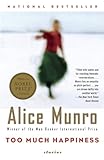 Munro’s retirement didn’t last. But unlike Jordan’s, her return to the game was not unpretty. Her 2009 collection, Too Much Happiness, was a critical success. Even Dolnick was delighted when Dear Life followed it late last year. He wrote, “Much of the material here will be familiar to anyone who has ever read her — the train trips and heartsick letters and unpaved roads — but the voice is newly sharpened, as if she were freshly aware of only having so many words remaining in her allotment.” Surely a writer’s desire to use up her allotment of words is justification for coming out of retirement.
Munro’s retirement didn’t last. But unlike Jordan’s, her return to the game was not unpretty. Her 2009 collection, Too Much Happiness, was a critical success. Even Dolnick was delighted when Dear Life followed it late last year. He wrote, “Much of the material here will be familiar to anyone who has ever read her — the train trips and heartsick letters and unpaved roads — but the voice is newly sharpened, as if she were freshly aware of only having so many words remaining in her allotment.” Surely a writer’s desire to use up her allotment of words is justification for coming out of retirement.
In an interview in 2010, the year after Too Much Happiness appeared, Munro was asked what advice she would give to young writers. She replied, “If you’re going to be a writer you’ll probably take a lot of wrong turns and then one day just end up writing something you have to write, then getting it better and better just because you want it to be better, and even when you get old and think ‘There must be something else people do,’ you won’t be able to quit.” Munro is now 81, and still writing.
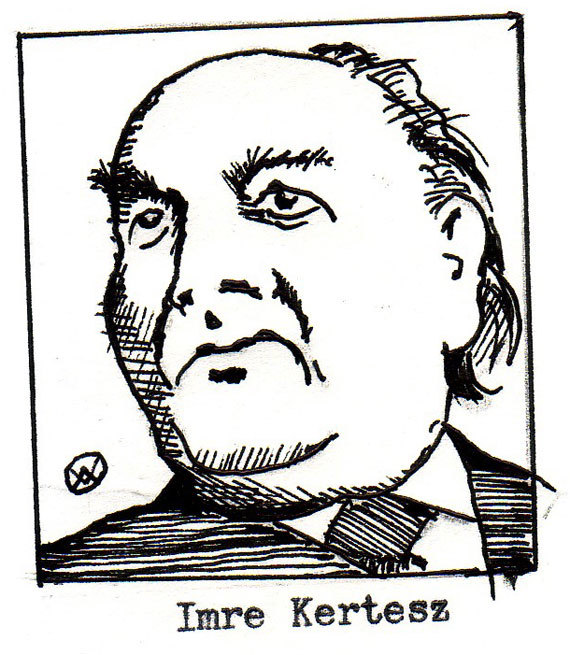 4. Retiring Ambiguously: Imre Kertesz
4. Retiring Ambiguously: Imre Kertesz
The Hungarian writer Imre Kertesz, who survived the camps at Auschwitz and Buchenwald and went on to win the Nobel Prize in Literature in 2002, announced his retirement last November. Or did he? In an interview with a German magazine, Kertesz, who is 83 and suffering from Parkinson’s disease, said, “I don’t want to write anymore. I consider my oeuvre, so closely related to the Holocaust, as closed, whether I succeeded or not.” Sounds like a retirement announcement to me. It did to the French journal ActuaLitte, too, which picked up the news. The Millions followed suit. As these reports spread, however, Kertesz’s American publisher, Dennis Johnson, posted a recollection of visiting Kertesz and his wife in Berlin last March. “The only really somber moment occurred when Imre spoke of his fear of not being able to finish the new book he was working on,” Johnson wrote. “Still, he was making progress, he insisted, and was determined to get it done.”
When the reports of his retirement began circulating several months after that meeting in Berlin, Kertesz wrote to Johnson that the rumors were “a bit too hasty.” He added, “Naturally, I will try to write as long as I can.” Ah, ambiguity.
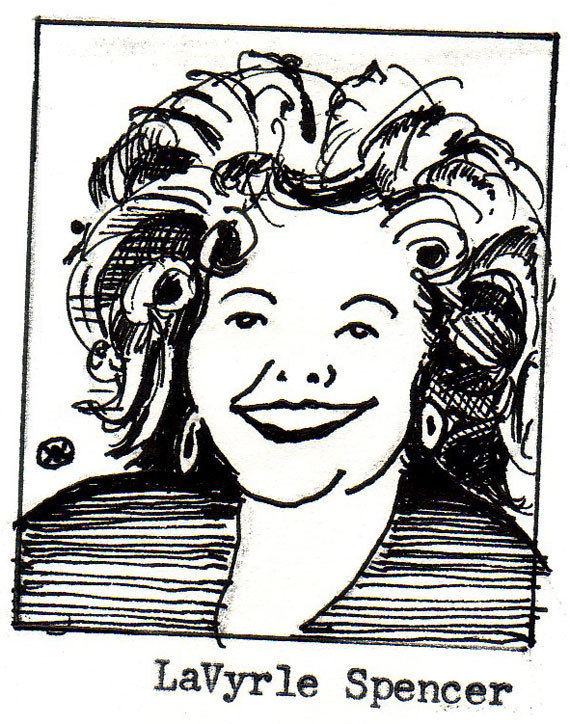 5. Retiring Richly: LaVyrle Spencer
5. Retiring Richly: LaVyrle Spencer
It’s always refreshing to meet writers who admit they’re in it for the money, and it’s important to remember that they’re not always hacks. As Flannery O’Connor once noted, no writer was hotter after the dollar than Henry James. The Master gets some competition from LaVyrle Spencer, who wrote her first romance novel when she was in her 30s and working as a junior high school teacher’s aide in Minnesota. She went on to produce 23 novels, including a dozen New York Times best sellers, and was inducted into the Romance Writers of America Hall of Fame. Then, at the age of 54, she retired from writing. Why did she quit cold when she was selling millions of books and making millions of dollars? It’s downright…un-American. “I want to feel free!” she told Publishers Weekly. She added that she had set a financial goal when she was starting writing novels, and once she reached it she promised herself she would retire. Unlike so many others, she kept her vow. She told PW she planned to enjoy her two young grandchildren and travel with her husband. No grim imperative for LaVyrle Spencer.
6. Retiring Gradually: Roberto Bolaño
You can’t get any more retired than dead, yet writers of a certain stature have a tendency to keep publishing from the grave. Recent examples have included Vladimir Nabokov, Ralph Ellison, David Foster Wallace, and James M. Cain. (Many fans are hopeful that J.D. Salinger did indeed keep writing during his long silence in New Hampshire, and that eventually he will join the club.)
 But no dead writer has out-produced the Chilean novelist, poet, and short story writer Roberto Bolaño, whose estate has put out a torrent of titles since he died of liver failure in 2003 at age 50. The posthumous output peaked with 2666, a novel of breathtaking sweep built around the disappearance of hundreds of women near the Texas-Mexico border. The torrent is finally subsiding, but scholars, critics and biographers are sure to keep picking over Bolaño’s life and work for years to come.
But no dead writer has out-produced the Chilean novelist, poet, and short story writer Roberto Bolaño, whose estate has put out a torrent of titles since he died of liver failure in 2003 at age 50. The posthumous output peaked with 2666, a novel of breathtaking sweep built around the disappearance of hundreds of women near the Texas-Mexico border. The torrent is finally subsiding, but scholars, critics and biographers are sure to keep picking over Bolaño’s life and work for years to come.
Which brings us to the paradoxical answer to the question posed in this essay’s title: It turns out that, yes, it’s possible for any writer to retire, but the good ones live on long after they die, and the great ones are never allowed to die. William Faulkner wanted the epitaph on his tombstone to read, “He wrote the books, and he died.” More fitting would have been: “He wrote the books, and he died, but the books were so good that people kept reading them for years and years after he was gone to dust.”
Images courtesy of the author.








